Better to see you my dear!
There are many things in life that we take so much for granted. Eyesight is just one of them. As long as our sight is good, we will happily sail along not thinking twice about how this most important organ of senses in our body has an impact on our daily life. However, when vision problems develop we will for sure do everything possible to bring our eyesight back to normal.
Remember your mother’s words ‘eat the carrots- they are good for your eyes’. They may not make you see better than you already do, but there is a lot of truth in the idea that they can help protect vision. It is not just carrots, there is an array of foods that are good for eye health and one of the best things you can do is to eat a balanced antioxidant rich diet high in fruits and vegetables, but also low in saturated fats and sugar.
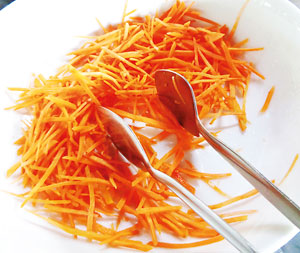
Carrots
Carrots
Orange-coloured fruits and vegetables like carrots, sweet potatoes, cantaloupe, mangoes, and apricots are high in beta-carotene, a precursor of vitamin A required for good eye health and vision. This vitamin along with vitamins C and E helps to reduce cataracts and deteriorating vision which is an inevitable part of aging. Toss them in your salad, dip them in hummus, or just munch on them plain.
Bell peppers
These are one of the richest sources of vitamin A and C. Both these vitamins can combat many eye problems. The peppers also contain ample amount of vitamin B6, the carotenoids, lutein, zeaxanthin, beta-carotene as well as lycopene. All of these are important for healthy vision. So bake, grill, stir-fry or simply have them raw for maximum benefit.
Eggs
Eggs are a great package deal. The lutein and zeaxanthin in eggs are linked to a reduced risk of age-related macular degeneration, which is a leading cause of loss of vision in older adults. Zeaxanthin in egg yolk helps protect eyes against damage due to ultraviolet radiation from the sun, while the zinc will help your body use the lutein and zeaxanthin and the selenium will help protect the retina.
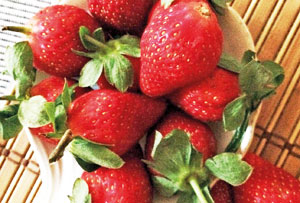
Strawberries
Strawberries
Fresh strawberries contain plenty of vitamin C which is an antioxidant that can lower risk of cataracts and susceptibility to infections. Strawberries can also contribute to fixing eye pressure as they contain potassium, which helps in maintaining the correct pressure. Also, be sure to load up your plate with other vitamin C rich foods such as bell peppers, broccoli and citrus fruits.
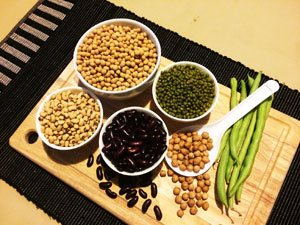
Beans and legumes
Dark leafy greens
Keep eating the dark greens, kale, spinach, collard greens packed with the key antioxidants, lutein and zeaxanthin also found in high concentration in a healthy macula. The macula is part of the retina at the back of the eye responsible for all of our central vision, most of our colour vision and the fine detail of what we see. Try them in a smoothie for a change.
Oysters
Oysters are one of the richest dietary sources of zinc, just one can provide an adult with the daily mineral requirement. Zinc ensures that the eye’s pigment is adequately produced in the retina. Reduced pigmentation is related to a reduction in the central visual field of vision, so the more zinc the stronger your eyesight will be.
Salmon
Dry eyes? Eating enough omega-3 fatty acids can help alleviate the problem. Get some healthy fats at least two to three times a week in the form of salmon or other types of fish. Salmon is also a good source of vitamin D, which helps protect against macular degeneration and glaucoma. You can grill, poach, bake or eat it raw often served as sushi or sashimi.
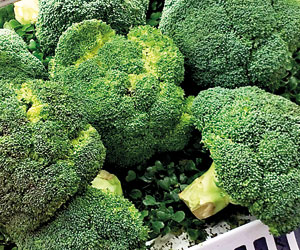
Broccoli
Broccoli
Broccoli is packed with antioxidants, and carotenoids that act as protective pigments for the eyes. Broccoli also contains vitamin B2, which if deficient can lead to eyes which are super sensitive to light, resulting in fatigue, inflammation and hazy vision. Steam, roast or stir fry with a little water or have it in salad or as a snack with a dip.
Beans and legumes
If you prefer a vegetarian, low-fat, high-fibre option to help keep your vision sharp at night and slow age-related macular degeneration, eat the beans and legumes. Chickpeas are also high in zinc, as are black-eyed peas, kidney beans and lentils. A can of baked beans will do the job, too.
Kiwi fruit
A high source of vitamin C the kiwi fruit helps to maintain collagen in the cornea and is associated with reducing risk of macular degeneration by supporting healthy blood vessels as they contain the antioxidants lutein and zeaxanthin. Blend with berries for a nutrient rich smoothie or add to a salad with the skin for some extra fibre.
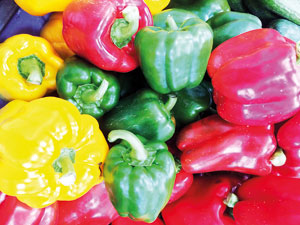
Bell peppers
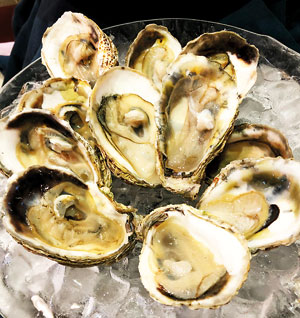
Oysters


